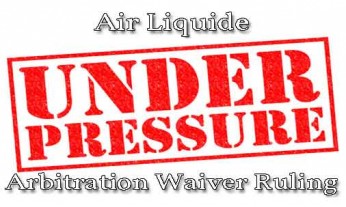 Mario Garrido signed and arbitration waiver when he was hired as a truck driver for American Air Liquide, Inc. in Santa Fe Springs, California. The arbitration waiver required him to resolve any disputes with his employer via arbitration and included a provision prohibiting class arbitration.
Mario Garrido signed and arbitration waiver when he was hired as a truck driver for American Air Liquide, Inc. in Santa Fe Springs, California. The arbitration waiver required him to resolve any disputes with his employer via arbitration and included a provision prohibiting class arbitration.
After Garrido lost his job, however, he filed a class action complaint against Air Liquide, alleging that he and his co-workers were subjected to a variety of unfair labor practices. Air Liquide responded by filing a motion to compel arbitration, but the trial court denied the motion, holding that Garrido had a right to file a class action claim. Air Liquide appealed.
On October 26, 2015, a California Court of Appeal upheld the decision, siding with Garrido. The ruling, Garrido v. Air Liquide Industrial U.S. LP, established several important precedents for cases involving arbitration waivers in the following areas:
To Whom Does the Federal Arbitration Act Apply?
The arbitration agreement that Garrido signed when he began working for Air Liquide stated that it was governed by the Federal Arbitration Act (FAA). Garrido argued that this provision was invalid because the FAA itself states that it does not apply to transportation workers. Air Liquide argued that Garrido should not be considered a transportation worker because Air Liquide is not in the transportation industry.
The Court of Appeal agreed with Garrido and held that as a truck driver, he was excluded from the FAA. The ruling states that a truck driver is a transportation worker, regardless of who owns the goods that the driver transports.
Can the CAA Apply Automatically?
The California Arbitration Act (CAA) was not mentioned in the arbitration waiver. Garrido argued that, in light of this, it could not apply to his case, but the court disagreed. The ruling holds that the CAA can be enforced even when it has not been explicitly mentioned in an arbitration agreement.
Garrido argued that because Air Liquide’s motion to compel arbitration dealt with the FAA, and not the CAA, Air Liquide lost its right to compel arbitration under state law. The court disagreed with this, as well, pointing out that Air Liquide had never argued that the CAA would not apply.
Can the State Refuse to Enforce a Class Arbitration Waiver in a Non-FAA Case?
Garrido argued that, even though the arbitration agreement contained a class waiver, his class action suit should nonetheless be allowed to proceed. While the California Supreme Court recently held the FAA prevents the state from striking down class waivers for public policy reasons, that decision did not address whether it would be appropriate in a CAA case.
The Court of Appeal used the four-factor test applied in Gentry v. Superior Court, which is based on:
- The size of potential individual recovery,
- The potential for retaliation against class members,
- Whether absent members of the class may be unaware of their rights, and
- Obstacles to the use of individual arbitration.
After applying the test, the Court of Appeal agreed with the trial court that a class proceeding would be more effective than individual arbitration. [Read more…]

